BBC News Online was initially devised in 1997 as a response to CNN’s online news page, claims its creator and former Editor-in-Chief, Mike Smartt.
“The reason that the BBC decided to go online was that CNN went online in 1996. And because the BBC doesn’t do anything in a hurry, it took it a very long time to actually make the decision.”
Speaking at the University of Coventry as part of its ‘Coventry Conversations’ series, Smartt told of the early days of online news and the difficulties faced by both designers and journalists.
Online journalism had to wait for technology to permit it to expand to its full potential, he said. Deadlines were demolished and journalists were regularly spending over half an hour to write a code with their story, only to have to go back again when a space, comma or any other character wasn’t in place.
The BBC were very wary of going online at first, Smartt said. “Initially, in the BBC, the journalists rejected the idea for two reasons: the money that was used to finance it was obviously coming from radio and television, so there was some resentment, and the internet was seen, amongst the people in the more traditional media, as competition,” he confessed.
When they did push ahead with the idea, experience was obviously thin on the ground. “My only qualification was that I used one of these” he said, showing a picture of his laptop back in 1997. The initial website was running from a server similar both in size and internal technology to his original laptop, he said. “Actually, for three weeks when we first launched the server, big in theory, … looked like this, that’s what we served News Online from, for three weeks, in the corner of the Newsroom.”
He also spoke of the problem of deciding what a story should look like online, whether going on the internet meant that people were looking for “three Ceefax sentences” or something more in-depth. The BBC’s 1996 ‘Online News Concept’ outlined goals that are beginning to be met only recently: valuable text, high-quality pictures that load fast, high-quality audio, full screen videos and full interactivity.
The content of the first test pages was mostly made up of jokes, but the team, led by Smartt, had to redesign the site again and again until the first BBC News Online page was finally agreed upon. He showed one version of the front page with a lively design and a high number of images, but explained why they couldn’t go with it: “If you remember back then you had dial-up, and you literally rang them up, and then this sound came along, and then you were connected, and only later up came the site, very, very slowly.”
Smartt finished with a warning to those who are not prepared to embrace new forms of journalism: “If you can’t handle multi-media, and you will have to in future, you are doomed in this business.”
